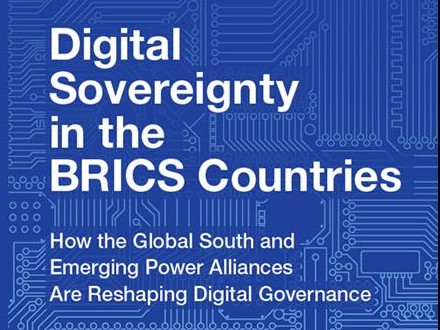How the Global South and Emerging Power Alliances Are Reshaping Digital Governance
This title is available as Open Access on Cambridge Core
Abstract
In a world where digital development and policymaking are dominated by Silicon Valley tech giants, the BRICS countries – Brazil, Russia, India, China, and South Africa – play an increasingly important role. With 40 percent of the world’s population and 25 percent of global GDP, these nations possess a vast trove of personal data. Yet, their conceptions, narratives, and initiatives of digital sovereignty remain understudied. This volume is the first to explore digital sovereignty from a Global South perspective and offers a forward-looking take on what a world less dependent on Silicon Valley might look like. It brings together excellent analyses of BRICS digital sovereignty issues, from historical imaginaries to up-to-date conceptualizations, e-payment to smart cities, and legal analysis to geopolitical assessment. By offering neglected perspectives from the Global South, this book makes important contributions to the digital sovereignty debate.
Min Jiang is Professor of Communication Studies and an affiliate faculty member of International Studies at the University of North Carolina at Charlotte. She is a secretariat member of the annual international Chinese Internet Research Conference (CIRC) and CyberBRICS Visiting Professor at FGV Law School (Rio de Janeiro, Brazil).
Luca Belli is Professor of Digital Governance and Regulation at FGV Law School, Rio de Janeiro, where he heads the Center for Technology and Society and the CyberBRICS project. He is Editor of the journal International Data Privacy Law and Director of Computers, Privacy and Data Protection Conference Latin America.
Table of Contents:
Special Acknowledgments: Institutional Sponsors for Open Access
1 – Introduction
Part I – State-centric Formations of Digital Sovereignty
2 – Digital Sovereignty in China, Russia, and India
3 – The Spatial Expansion of China’s Digital Sovereignty
4 – South African Digital Sovereignty at the Crossroad of Securitization and Development
Part II – Techno-economic Structurings of Digital Sovereignty
5 – Digital Sovereignty and Payments
6 – Digital Statecraft of Middle Powers
7 – A Modulated Approach to Digital Sovereignty
Part III – Grassroots Contestations of Digital Sovereignty
8 – Circumventing the “Sovereignization” of the Russian Internet
9 – Brazilian Activism in Mastodon
10 – Conclusion

